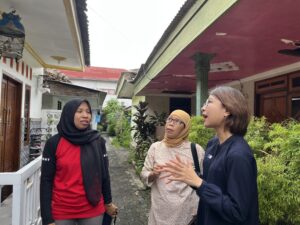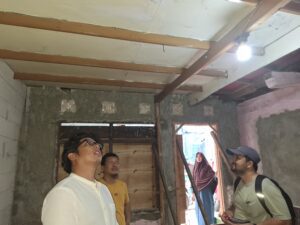Case Study: Scaling Disaster- and Climate-Resilient Housing in Indonesia

Ariana Karamallis
Global Advocacy and Development Manager
Introduction
Between 1990 and 2021, Indonesia experienced over 300 disasters, affecting 11 million people. Climate-related events accounted for 70% of these disasters. The country is also the most seismically active in the world, with more than 21,500 earthquakes (magnitude 4 and above) recorded in the last decade. Coupled with high population density and poor construction quality, millions of Indonesians live in unsafe housing conditions.
Build Change has been working in Indonesia since 2005 to strengthen homes and promote disaster-resilient construction. Our homeowner-driven housing reconstruction and retrofit programs, disaster risk reduction training, policy advocacy, and technical assistance have reached over 450,000 people and improved the safety of more than 90,000 buildings across regions such as Aceh, West Sumatra, Bengkulu, Central & West Java, Lombok, and Central Sulawesi.

Proving impact through safer structures
Our work demonstrates that safer housing is achievable and scalable. Following the 2007 earthquake in West Sumatra, homes that met Build Change’s minimum structural standards withstood the 2009 quakes with no reported damage. This proof of concept has resulted in lives and losses avoided.
In 2017, Statistics Indonesia revealed that almost 80% of residential houses were built without engineers or government oversight, leaving millions in substandard homes. These are the very homes our approach seeks to transform into safer, disaster-resilient structures.
Policy Influence and Government Partnerships
Build Change has actively contributed to national efforts such as the government’s Bantuan Stimulan Perumahan Swadaya (BSPS) subsidy program, which targets low-income households. Between 2017–2023, more than 1 million homes have improved in quality and disaster-resiliency through BSPS. Moving forward, BSPS is expected to contribute—alongside other housing programs—to the government’s target of improving up to 3 million homes per year.
In partnership with the World Bank and the Ministry of Public Works and Public Housing, Build Change conducted surveys of more than 500 homes across three regions. The evaluation revealed that only 11% of houses met minimum earthquake-resistant standards. Significant financing gaps and lack of structural compliance were identified.
As a result, we presented recommendations to national authorities and the World Bank. These included increasing subsidies, strengthening quality control standards, and improving construction oversight. The government implemented many of these measures, which, according to the Ministry of Public Works, led to a substantial increase in compliance—from 11% to 75%.
From response to prevention
In recent years, Build Change has expanded its focus from disaster response to prevention. This includes school retrofit initiatives, better building materials programs, and technical support to homeowners before disaster strikes. These preventative approaches aim to reduce risk before an event occurs.
In 2024, with support from the Global Innovation Fund, we partnered with KOMIDA, a women-centered local microfinance institution (MFI), to launch Incremental Climate Adaptation Loans (ICALs). These loans help low-income households—living on less than $5/day—afford incremental home improvements for greater resilience to climate and disaster risks. The program combines financing with technical assistance, promoting safer construction practices.

Green and Affordable Housing at scale
The Indonesia Green Affordable Housing Program (IGAHP), supported by Build Change and the World Bank, is currently in a pilot phase. The program aims to deliver affordable, environmentally sustainable, and disaster-resilient housing to low-income communities. While it has not been officially launched, it is undergoing testing and finalization of loan agreements and regulatory frameworks, with plans for broader implementation in the near future, delivering 1 million units of green and resilient housing by 2030.
Build Change supports this effort through:
- Resilient housing retrofit designs
- A housing quality enforcement mechanism
- Capacity building for government stakeholders
These efforts ensure that structural resilience is integrated into the country’s growing housing programs. The collaboration reflects increased government capacity and international investment driving forward climate-resilient infrastructure in Indonesia.
Lessons learned
Build Change’s long standing engagement in Indonesia has surfaced essential lessons to inform policy, program design, and future scaling of disaster- and climate-resilient housing.
- Retrofitting and safe construction are feasible and cost-effective when supported by technical assistance, financing, and community outreach.
- Inconsistent enforcement of building codes and poor construction quality remains a major challenge, particularly for single-story homes.
- Incentive structures—like tying subsidy disbursements to compliance and offering lower interest rates or green building certification—encourage higher standards.
- Awareness and demand for resilient housing remains low. Programs like IGAHP present strategic opportunities to increase public knowledge and adoption of safe practices.
- Implementing quality assurance and control mechanisms is challenging when not institutionalized. Incorporating quality requirements directly into loan agreements, as is now done in some programs, is proving more effective.
- Digital tools like BCtap can help bridge supervision gaps caused by limited enforcement capacity and field resources.
- Future programs should incorporate location-based criteria into their assessment processes. Homes located in tsunami zones, areas prone to landslides, or regions at risk of liquefaction require geotechnical evaluations to determine the most effective mitigation strategies. In some cases, relocation may be a more appropriate investment than retrofitting.
Looking ahead
To scale this work further, Build Change recommends embedding technical assistance into national housing programs from the outset. This includes enforcing quality standards across financing agreements, project implementation, and administrative procedures.
The launch of IGAHP offers a timely opportunity to mainstream climate-resilient, affordable housing across Indonesia—reaching the most vulnerable communities before disaster strikes.
Support resilient housing worldwide
Join us in preventing housing loss caused by disasters.
Donate nowNewsletter
Sign up for our newsletter to receive updates on our latest news, events, and more.